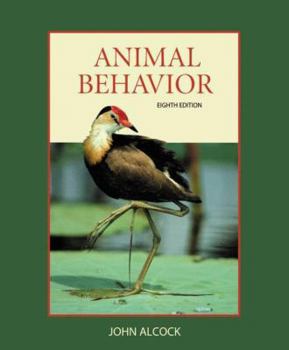Animal Behavior: An Evolutionary Approach
Select Format
Select Condition 
Book Overview
This new edition of Animal Behavior maintains the organizational structure of previous editions, but has been completely rewritten with coverage of much recent work in animal behaviour, resulting in a... This description may be from another edition of this product.
Format:Hardcover
Language:English
ISBN:0878930051
ISBN13:9780878930050
Release Date:April 2005
Publisher:Sinauer Associates
Length:564 Pages
Weight:3.80 lbs.
Dimensions:1.1" x 9.3" x 11.1"
Customer Reviews
5 ratings
text book
Published by Thriftbooks.com User , 14 years ago
the book looks how it said it would--perfect condition. it came in a timely fashion.
Fun and Educational
Published by Thriftbooks.com User , 17 years ago
This was a textbook for a class and it is as fun and easy to read as a textbook can be. Lots of good pictures and examples.
A textbook you would read for fun
Published by Thriftbooks.com User , 18 years ago
This is hands-down the best textbook I had in college (as a ucla psych major).
From sea slugs to siblings
Published by Thriftbooks.com User , 20 years ago
There's benefit in starting this book at the final chapter. After all, we consider humans the most important member of the animal kingdom. A quick perusal of Chapter 15, "The Evolution of Human Behavior", introduces you to many issues within that topic. The question that must arise, is "how did we get to be that way?". To answer that question, simply turn to page 1 and start reading. The rewards gained by following John Alcock's presentation are beyond measure. He's an outstanding researcher and analyst. His writing demonstrates the importance of understanding why this book is necessary for both professional and novice. The behavioural traits he explains show the workings of evolution. We are but one of the products of that process.Stating that Darwin's concept of evolution was a "blockbuster" of an idea, he argues it illuminates everything once you have the courage to look. He uses the concept of "proximate" and "ultimate" causes in analysing traits and deriving their origins. What we see in nature are the "proximate" causes of behaviour - how do a moth's muscles make the wings move in a particular way? The "ultimate" cause is what, if anything is gained by the action or behaviour? Answering the second question leads to a probable explanation of how evolution brought the feature about. Traits are the result of a long series of tiny steps leading to what is seen today. Alcock demonstrates that there are many influences affecting the course of evolution.Alcock presents an array of examples neatly arranged in groupings such as environmental impact, heredity, mating and feeding. How does the ungainly seaslug discern predator approach and how does it escape? Why do so many male birds sing, and so few females? How do night-flying moths evade the sonar-equipped bat? Why is the Monarch butterfly so brilliant in colour while other butterflies and moths seem drab and muted? How do we recognize faces? The underlying question in each example is whether the observed property is a beneficial adaptation.Every trait is subject to a balance of "benefits" and "costs" - camouflage to hide from predators may also cloak you from a possible mate. Alcock examines this balance for many species, noting that some assessments remain in dispute. Testing alternative hypotheses is a major sub-theme of this book. Considering "cost/benefit" of human behaviours is only now being undertaken, but is just as applicable to us as to other animals. What are the benefits of a social environment such as ours? What are the costs involved in maintaining this type of existence? One "cost/benefit" analysis is the evolution of "helpers". Humans long believed the rest of the animal world never exhibited altruism. Yet, now it's known that "assistance to others" can range from adoption of offspring to a variety of reciprocal trade-offs of many types across many species.Although this book is designed as a classroom text, the writing style, illustrative material and
Essential reading
Published by Thriftbooks.com User , 26 years ago
John Alcock's Animal Behavior is both an excellent introduction to, and a well-balanced survey of, an extremely complex field. Extensive references support a text which is -- remarkably -- both informative and lightly humorous. This book is essential for every student of genetics, biology, or behavior (animal or human). As a psychiatrist of 30 years experience, this refreshing review of "natural" behavior was a very welcome relief from the often pointless meanderings that so frequently characterize the "behaviorists."




